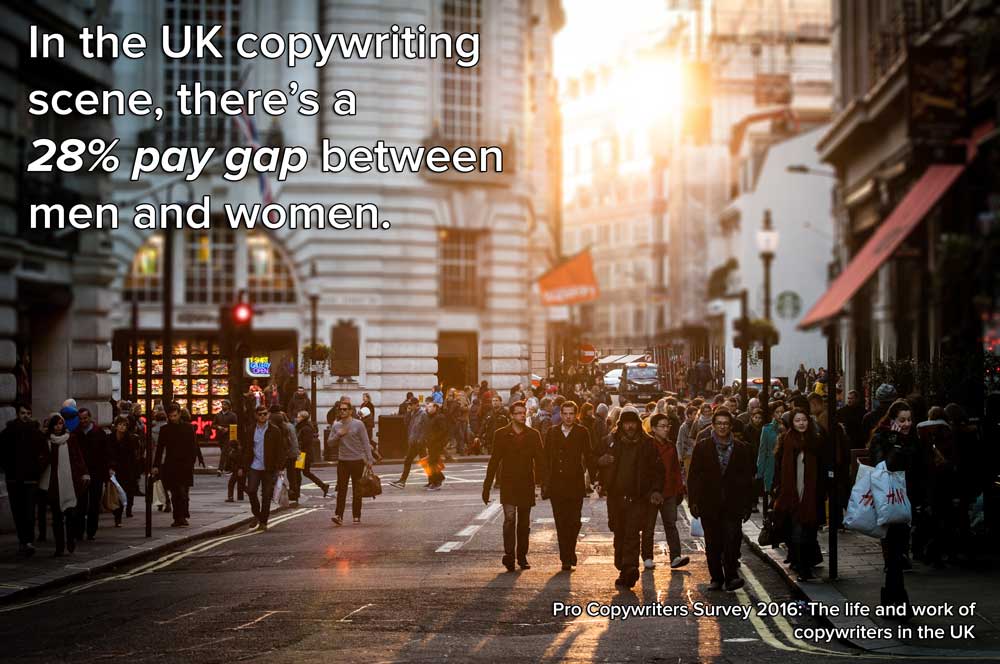It’s maddening. Depressing. Frankly, beyond reason. But (apparently) it’s true: in the United Kingdom, in 2016, a full-time female copywriter can expect to earn 28% less than her male counterpart.
At least, those are the findings of the latest Professional Copywriters’ Network survey, in which 610 copywriters (342 of them women) gave full and frank views about how they work and – revealingly – what they earn.
Although there may have been some mix up with full and part-time earnings, the trend is clear across the board:
- Female freelancers earn 22% less.
- Female agency writers earn 33% less.
- Female client-side writers earn 9% less.
(Meanwhile, there’s a whole conference about the fact my own job title is a mind-boggling 97% male.)
As a professional copywriter, and a pro-feminist, I’m keen to know precisely what the fuck is going on. But the last thing this issue needs is yet another male voice, mansplaining away. So we asked a selection of female copywriters from all parts of the industry about their experiences, what (if anything) they think should be done, and by whom.
Their responses were startlingly honest, and revealing. We’d like to share them with you.
“It’s a confidence thing.”
Irene Triendl, B2B tech copywriter:
To rehash a couple of well-known (but true) stereotypes, I know that women are usually terrible at charging what their work is worth – or they’ll throw in a lot of extra stuff (such as proofreading) for free.
Then, they’ll often pre-emptively deduct any imagined shortcomings (“It’s true that I’m a marine biologist, but I’ve never written about seahorse vivisection before, really…”) from the final invoice. It’s a confidence thing.
And, like so many creatives, many suffer from the “one day they’ll find out I’m not a real [designer/artist/copywriter]” syndrome. And so they let clients confuse them with someone who simply put out a shingle that says “copywriter”, rather than a specialised marketing professional.
“I’m sure this is worse for freelancers working in isolation, but I’m almost certain the mindset trickles into salary negotiations for agency writers as well.”
I guess the only way out of it is an aggressive openness about earnings among female copywriters. We need to talk about what we charge, and why, and define the value we bring to our clients (for ourselves as much as for them).
“Many other women are not nearly so fortunate.”
Fiona Campbell-Howes, managing director, Radix Communications:
I’ve never felt gender was a factor in the professional opportunities open to me, or in how much I was paid.
Luckily for me I had my two children later in life, while running my own copywriting business, so I had complete control over how long I took off work and how much I paid myself during those breaks. As it was my own business, I was secure in the knowledge I could come back to the same job, when I wanted to, without any difficulty. And as my husband works from home, I’ve been extremely fortunate that he has been able to take on the role as primary carer for the children, allowing me to work full-time and build up my business.
Many other women are not nearly so fortunate in terms of the professional opportunities open to them after having kids.
Writing is one of the jobs that it’s very easy to do on a freelance basis, working flexible hours from home. So perhaps (I haven’t seen any direct evidence of this), female writers who start out in an agency or in-house role choose to go freelance when they have children, while their male counterparts stay employed and work their way up the ladder.
For freelancers, it may be that women set lower rates for themselves than male counterparts do, possibly due to ingrained issues of confidence and self-worth, though again I have no evidence of this. (In fact when I was a freelancer I think I charged some of the highest rates in the industry!)
It’s also possible that more male writers than female specialise in industries like tech, where the niche specialism, the relatively small talent pool, and the challenging nature of the work command higher rates.
“I’ve only had two roles where I’ve been in a position to know what writer colleagues are earning – and in both of them it was my job to decide salaries.”
I can say hand on heart that gender has never been a consideration in any salary decisions I’ve made for my team members – but then, because I’ve tended to hire writers who were recommended to me, and there seem to be relatively few female writers who specialise in B2B technology, all of those writers have been male.
The one time Radix did go through a formal recruitment process, I hired one male and one female writer, the latter of whom is now our content marketing manager. I’m now committed to running a formal recruitment process every time we hire writers, to try to attract more female writers to apply to work with us.
Employers need to ensure that writers who deliver equal value to the organisation and its clients are paid an equal amount. If some parties are keen to negotiate for higher pay while others are happy with a lower salary, maintaining parity might mean insisting an employee take a pay rise even if they initially try to decline it.
“For self-employed writers, it’s their responsibility to set their own rates, commensurate with the value they provide to their clients, and be prepared to defend them.”
As there historically hasn’t been very much information available about “going rates”, surveys like the new PCN one are invaluable in helping all writers determine and stick to the rates they charge.
“I am a mother, first and foremost.”
Jenny Parish*, freelance copywriter
I am a freelance writer but have had the same primary client for about five years. I work for up to five clients at a time, creating B2B and B2C copy. I believe that people should be judged, and paid, according to their merits, not their gender; to that end I guess you can say I am a feminist.
But I am also a mother, first and foremost. While the primal role of my husband is to protect and provide for his family, my innate instinct is to stay near my nest; that means being there on the school run, and doing all the dull, mundane, wonderful things that come with motherhood.
“That doesn’t mean that I don’t think women should and can do well in any industry; it means that I made my choice to prioritise my family by letting my career take a back seat.”
It’s controversial and I know plenty of hard working, high-achieving women who do their very best to create the perfect balance but, for my family, I believed that to give my all to my children, my career should be sacrificed.
I’ll be honest, I know my pay is bad for the work I do, but I don’t mind. Here’s why. I live in Devon and my daily pay is good for the area, albeit terrible for my industry. I am ashamed to admit it but I’m grateful. My relatively poor pay allows me to pay for holidays, dance classes, shoes, wine; all the fun stuff!
We are financially comfortable; I know I could be well off but money, quite simply, isn’t a motivating factor for me. Taking the children for a surf on the beach straight after school, that’s motivational. I work hard during term time and schedule my work to allow me to have the majority of school holidays off – my children have never seen the inside of a “holiday club”!
“I have rarely missed a school event, meeting or assembly. Once, just once, have I been unable to go to school to get an ill child.”
If you were to ask me whose responsibility it is to bridge the gap between men and women’s pay, I’d say all of ours – but to be honest, I know much of the responsibility lies with people like me because, while there are grateful, nest loving, family-centric copywriters willing to work for a much lower rate, there will always be companies willing to offer women less than men.
I know it’s not right, but I made my choice and I consider it a huge privilege to be able to do what I do.
* Jenny asked us to change her name to protect her identity.
“He was a better negotiator than I was.”
CatCopyCreative, client-side and freelance copywriter
I was quite shocked by the 28% pay gap on the survey but mainly because this isn’t something I’ve experienced. I work full time client side and also work freelance. My fellow client side copywriters are also female, however I’ve not seen any evidence of a pay gap between us as we’re all graded by the same salary band, which is comparable to industry averages, so any inequality is eradicated.
However, I worked agency side for 10 years as a copywriter and AM, and did experience a pay gap between myself and a male colleague of approximately £2k. I put this down to him being a better negotiator than I was, rather than ability to do the job, as I’ve never felt that being female has held me back professionally.
“It’s on me, not my company.”
Honor Clement-Hayes, in-house copywriter, Ingenie
I was as surprised as anyone that there’s such a big gender-based gap in earnings. Anecdotally, I earn good money compared with other copywriters my age, which I’d kind of assumed was an in-house thing. I’ve usually worked alone in copywriting so I don’t have a male-female comparison for what I earn.
That said, I know I’ve been too demure about asking for pay rises. I’ve accepted annual rises without debate, despite knowing I should probably ask for more. That’s on me, not my company.
In my freelance life, I know I’ve pitched myself way too low in the past, due to a lack of confidence. Why would someone pay loads of money for my stuff? I’ve managed to pull myself out of that now but it’s possible a man would have been less hesitant with pricing.
I think part of the problem is female copywriters not believing their writing is worth enough. I know good copywriting is worth money and that my copywriting is good. But I’m swayed by my worry about the client’s perception – do THEY know good copywriting is worth money?
Now, I’m a particularly anxious person and I can’t speak for all women, but I would imagine this is a more common thought process for us than men.
“A lot of women go freelance because it gives them greater flexibility, so perhaps they sacrifice higher earnings for working less than full time.”
When it comes to how gender has shaped my career, I think being a young female may have helped me because, like it or not (not), the people who first gave me a leg up were men and seemed to find my ambition ‘cute’. It makes me feel a bit sick to write it but that’s the way it was.
“I’ll paraphrase Caitlin Moran: flirt with everyone – men and women. If being ‘cute’ was the way forward, I don’t regret it.”
Over the last few years, I’ve got where I needed to go by being better than other candidates, so I’d say my gender isn’t a factor now.
In an industry where we largely set our own rates, it’s not really anyone’s responsibility to fix the problem of a gender pay gap. I would never tell a woman she’s spoiling it for the rest of us when she charges lower prices or works less so she can be more present for her children. I’d also never tell a man he’s at an unfair advantage when he negotiates a better pay rise than me. Good for him.
I’m responsible for getting the money I’m comfortable with. If I was really unhappy with what I was earning, I’d go out and get more. In freelancing, the way to earn more money is to charge more: give yourself a pay rise. Don’t take jobs that are a time-suck with no pay-off – if that makes you unhappy. If a copywriter is good at what they do, the work and the money is there. We mostly live our lives on the internet – gender holds much less weight here.
“The answer I have is to talk. Gather about yourself a group of copywriters that you trust; talk honestly about what you earn and what you’re unhappy about. In my experience, they’ll practically force you to get what you’re worth.”
[Note: Honor recently pointed out that she’s since changed her mind about the reasons for the pay gap, and what people need to do about it. She’s written a whole blog post about it, here.]
“Have the confidence to charge properly.”
Sharon Tanton, creative director, Valuable Content
I really don’t know why only 3% of creative directors are women – and I’m shocked at the pay gap. My instinct is that it’s due to women undervaluing themselves, particularly as freelancers.
When you start out as a freelance writer it’s easy to feel isolated – I had no real idea what other people charged – and felt uncomfortable about putting a high price on something that for me came so easily. I can’t charge that just for a few words!
“It’s taken me a good few years in the industry to realise the real value of those few words, and the process I’ve evolved for creating them.”
Good copywriting and content writing is vital to digital marketing. Getting a message across in a few simple, likeable words is a real skill, and if you can do it, you should have the confidence to charge properly for it.
The right words are everything. Put your prices up, smart wordsmithing ladies!
Mansplaining the gender pay gap
As a man, I don’t want to say too much, other than to sum up. It’s weird to hear that I might have an inherent confidence in negotiations that some female colleagues lack. I always thought that anxiety over what to charge (changing the quote three times before it goes out) was something we all had in common. Maybe there’s privilege I need to check there.
It would be understandable if freelancers felt this most acutely – as Kady Potter’s excellent blog post on the same topic points out. But the survey shows the problem goes much wider than just that part of our industry: after all, the pay gap for freelancers (while still too high) is lower than for copywriters overall.
For me, the other part that’s particularly striking is the contrast in Fiona and Jenny’s stories – they show two possible responses to a society that still sees it as normal (or as Jenny put it “primal”) for a mother to put childcare first, and a father to go out and work.
Note that in the PCN survey, the pay gap is among full time writers, not full time equivalents. More than half of the female writers surveyed worked part-time, compared to just 21% of men. If women go part time in the second half of their career, the resulting gender age/seniority imbalance among the full-time writers could also be a contributing factor to unequal pay.
And that’s a pervasive, longstanding, patriarchy thing. As the 3% conference put it:
“Most of the issues start with a two-word phrase: lack of. Lack of support for motherhood, lack of mentorship, lack of awareness that femaleness is an asset to connecting to the consumer marketplace today, lack of celebration of female work due to gender bias of award juries, lack of women negotiating their first agency salary and every one thereafter.”
As so many of our contributors pointed out, one solution we all have is to talk. The “aggressive openness” Irene mentions seems a big part of making things fairer – both in our pay, and in our expectations about working life as a whole.
Kudos to the Professional Copywriters Network for making a start.
If you’d like to share your own experiences or theories – or if you’d like to respond to anything our contributors said – we’d love to hear from you. Please tweet us @radixcom.


